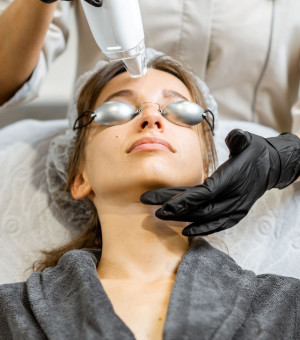When a pregnant person is dealing with pre-existing acne issues, managing this condition becomes a delicate challenge. Maintaining a prescribed treatment while ensuring the safety of the fetus is a crucial concern. Here are some tips for patients undergoing acne treatment and expecting a child.
First and foremost, it is very important to mention that patients contemplating conceiving a child and currently taking a prescription for acne or another skin condition must consult a doctor or dermatologist to check for contraindications of the prescribed medications. For example, it is imperative that patients taking Accutane stop this treatment before pregnancy because the treatment can cause lethal or major congenital abnormalities for the fetus. It is crucial to adjust the treatment plan for these patients before pregnancy.
Onset of Acne during Pregnancy
It is also possible to see a new onset of acne during pregnancy. This is often attributable to significant hormonal fluctuations. Increased hormone production, especially androgens, can stimulate the sebaceous glands of the skin, leading to excessive sebum production. This excess sebum can clog pores and promote the growth of bacteria, thus causing acne. Acne during pregnancy is a common concern for many expectant individuals. Here are some treatment options suitable for pregnancy.
Glycolic and Lactic Acids: Gentle Exfoliants
Glycolic and lactic acids, at moderate concentrations, can be a safe option for exfoliating the skin. This can help reduce the appearance of imperfections without compromising safety during pregnancy.
Low-Concentration Benzoyl Peroxide
Benzoyl peroxide, an antibacterial agent, can be maintained at low concentrations (2.5%) under the supervision of a healthcare professional. However, higher concentrations should be avoided.
Azelaic Acid: An Anti-Inflammatory Ally
Products containing azelaic acid can be an option, as this acid possesses anti-inflammatory and antibacterial properties, often necessary for treating acne.
Additional Considerations
Regular Hydration and Gentle Skincare
Regular hydration and the use of gentle skincare products are essential to maintain skin health during pregnancy. Opt for non-comedogenic products to avoid pore clogging.
Monitoring and Continuous Communication
Regular skin monitoring and continuous communication with a healthcare professional are crucial throughout pregnancy. If changes in the skin condition are observed, a reevaluation of the treatment plan may be necessary.
Managing acne during pregnancy for patients already in treatment requires an individualized approach and close communication with healthcare professionals. By adapting the existing treatment and choosing safe options, it is possible to maintain healthy skin while ensuring the safety of the baby to come. Always remember to consult your doctor before making changes to your treatment plan.



